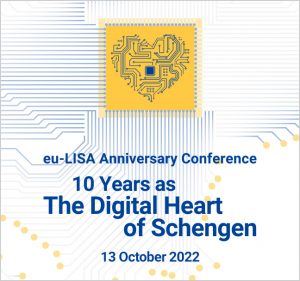Margaritis Schinas (European Commission Vice-President)

Margaritis Schinas took office as Vice-President for Promoting our European Way of Life in the Von der Leyen Commission in December 2019. In this capacity, he oversees the EU’s policies for migration, security union, social rights, skills, education, culture, youth, health and dialogue with churches, religious associations and non-confessional organisations.
Mr Schinas started his career in the European Commission in 1990. He also served as a Member of the European Parliament, from 2007 until 2009. Upon the completion of his parliamentary term of office, he returned to the European Commission and held various senior positions. In 2010, President Barroso appointed Mr Schinas as Deputy Head of the Bureau of European Policy Advisers. Later he served as Resident Director and Head of the Athens Office of the European Commission’s Directorate‑General for Economic and Financial Affairs (DG ECFIN). In 2014, President Juncker appointed Mr Schinas as the European Commission’s Chief Spokesperson.
Margaritis Schinas holds an MSc on Public Administration and Public Policy from the London School of Economics, a Diploma of Advanced European Studies on European Administrative Studies from the College of Europe in Bruges and a Degree in Law from the Aristotelean University of Thessaloniki.
You can follow him on Twitter: Margaritis Schinas (@MargSchinas)
Ylva Johansson (Commissioner for Home Affairs, European Commission)
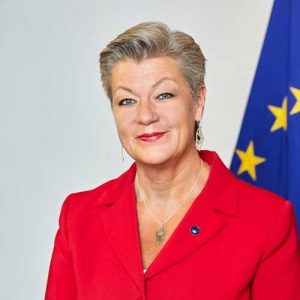
Ylva Johansson was appointed European Commissioner for Home Affairs in December 2019.
From Sweden, she was Minister for Employment in the Swedish Government from 2014 to 2019, Minister for Welfare and Elderly Healthcare from 2004 to 2006 and Minister for Schools from 1994 to 1998.
Ms. Johansson was educated at Lund University and the Stockholm Institute of Education. She is married with three children.
Juan Fernando López Aguilar (Member of European Parliament, Chair of the Committee on Civil Liberties, Justice and Home Affairs)

Mr López Aguilar has been a Professor of Constitutional Law (Faculty of Legal and Social Sciences, University of Las Palmas de Gran Canaria) and held the Jean Monnet Chair in European Law and Integration in the University of Bologna. He has received a BA in Political Science and Sociology from Universidad Complutense of Madrid, and Master in Law and Diplomacy from Fletcher School of Law and Diplomacy (Tufts University, Boston, Massachusetts).
Mr López Aguilar is an expert in comparative law, federalism, fundamental rights and judicial systems. He has been a visiting professor at different European and American universities.
He has been a member of the Spanish Parliament and was appointed Spanish Minister of Justice between 2004 and 2007. He is a Member of European Parliament since 2009 and a Chair of the Parliament Committee on Civil Liberties, Justice and Home Affairs (2009-2014 / 2019-2024).
He is an author of 15 books in constitutional law, and has written over a hundred articles, essays and scientific collaborations.
Vít Rakušan (1st Deputy Prime Minister and Minister of the Interior, Czech Republic)
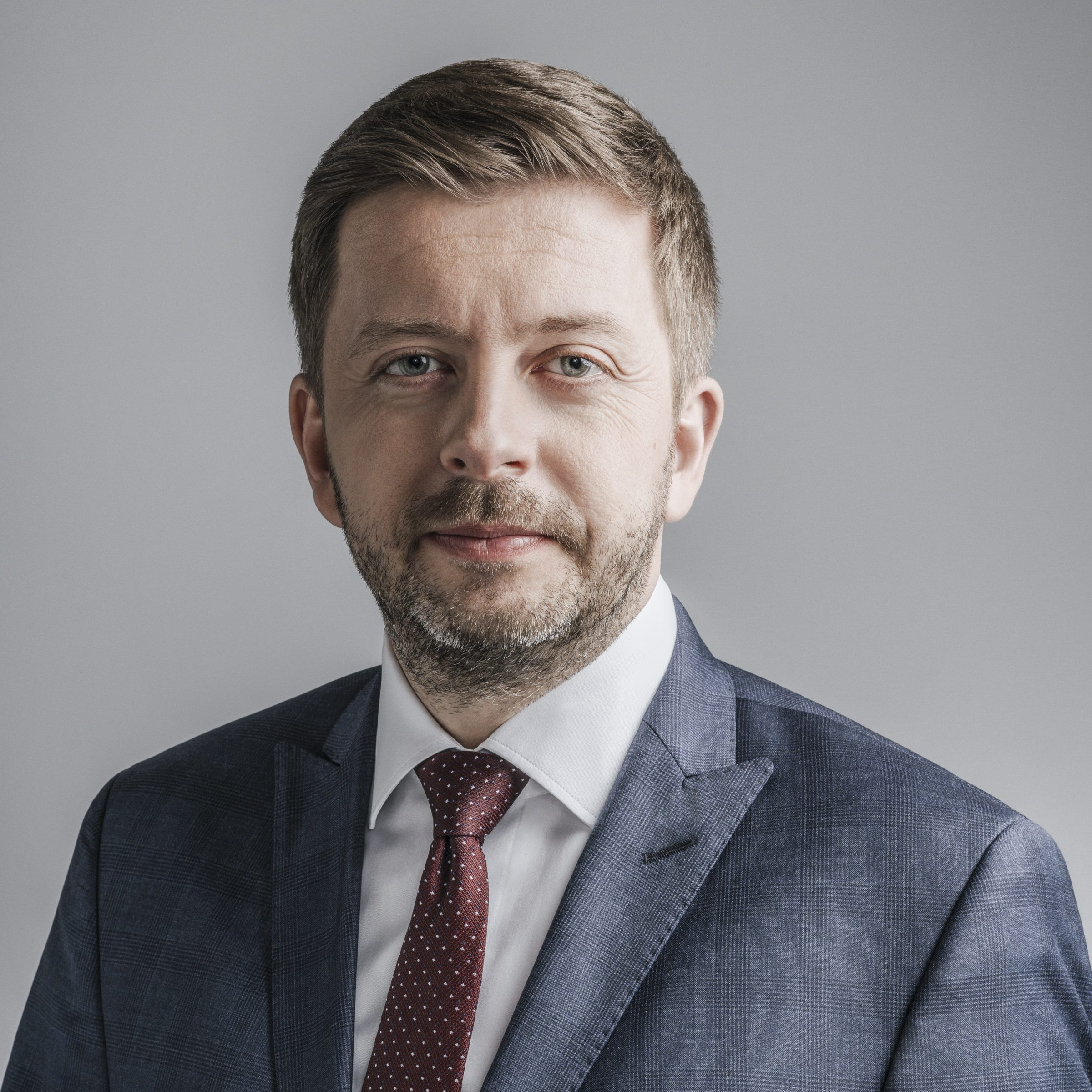
Mr Vít Rakušan is the 1st Deputy Prime Minister and Minister of the Interior of the Czech Republic. In 2010, he was elected mayor of Kolín and held this position until 2019. After being elected Chairman of the Mayors movement, he stepped down from his mayoral position. In 2016, he was listed in the New Europe 100 — changemakers in Central and Eastern Europe, announced by the Financial Times.
He spent a year as Statutory Deputy Governor of the Central Bohemian Region for the areas of security and tourism; this position ended when he was elected Member of Parliament of the Czech Republic. Between 2017–2021 he worked in the Security Committee and the Foreign Affairs Committee of the Chamber of Deputies of the Parliament of the Czech Republic. He was also the chairman of the Permanent Commission for the Supervision of Military Intelligence Service.
Krum Garkov (Executive Director, eu-LISA)

Mr Garkov has more than 20 years of cross-cultural experiences spanning the public and private sectors. He took up the Executive Director post at eu-LISA in November 2012 and has led the Agency with the vision to promote information and communication technologies as a key success factor for integrated border management and law enforcement at the EU level. He sees eu-LISA’s mission in helping Members States in their efforts for safer Europe and ensuring the continuous and stable service delivery to them in the ever-evolving digital environment.
Before eu-LISA, he was the Operations Director for Experian Group Ltd., a leading global information provider serving the finance industry. Prior to that, Mr Garkov was Program Manager at Hewlett-Packard. He has also served the National Revenue Agency, as well as the Centre for Mass Privatization in Bulgaria. Mr Garkov holds an M. Sc. in Computer Technologies (Varna), an MBA in Information Systems (Stevens Institute of Technology, New Jersey) and has received executive education from London School of Business & Finance with an MBA in Management Consulting.
Dimitris Avramopoulos (former European Commissioner for Migration, Home Affairs and Citizenship)
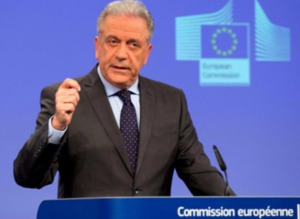
Dimitris Avramopoulos is a Greek politician and diplomat whose career in public service spans four decades.
He was the European Commissioner for Migration, Home Affairs and Citizenship from 2014 until 2019.
Previously, Mr Avramopoulos served as Minister of Foreign Affairs, Minister of National Defence (two terms), Minister of Tourism and Minister of Health and Social Solidarity of the Hellenic Republic, also having been elected MP several times. Before, Dimitris Avramopoulos served twice as Mayor of Athens (1995 to 2002).
Mr Avramopoulos is Honorary Doctor of Adelphi University, Drexel University, Kingston University and Deree – The American College of Greece. He is also Honorary Professor of Peking University & the European College of Parma.
Mr Avramopoulos has been bestowed awards and state decorations from more than 20 countries and has been presented with highest distinctions from more than 40 foreign and 40 Greek cities.
Dimitris Avramopoulos holds a BA degree in Political Science from the University of Athens and a MA degree in European Studies from the Université libre de Bruxelles. In 2003, he was Visiting Fellow at the Harvard Kennedy School.
He is married to Vivian and is father of two sons, Filippos & Iason.
Zsolt Szolnoki (Senior High Counsellor, Ministry of Interior of Hungary; Chair of the Management Board of eu-LISA)
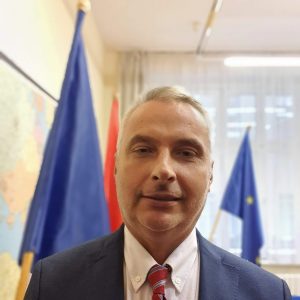
Mr Szolnoki currently serves as a Senior High Counsellor in the Ministry of Interior of Hungary and he is also the Chair of the Management Board of eu-LISA. As the Chair of the Board since 2018, he actively participated in the setting up of the new governing structure of the Agency. In the Ministry of Interior of Hungary, he is responsible for managing the whole Interoperability Programme including all related projects (EES, ETIA, SIS, VIS, ECRIS TCN, interoperability) in the area of the Home Affairs.
Previously he worked for the Hungarian National Election Office as the Deputy Head of the Election Department and later as Head of IT department in the Ministry of Interior. From 2006 till November 2010, he worked for the European Commission as a Seconded National Expert on the area of Home Affairs. In 2011 he was the Chairman of a working group in the Hungarian EU Presidency team.
In his volunteer capacity, Mr Szolnoki is the Secretary General of the Association of the European Election Officials (ACEEEO). He holds a BA in Public Administration and completed a post graduate course in Business Management at the Budapest University of Public Service.
Piret Lilleväli (Undersecretary for Resources, Planning and Technology, Estonian Ministry of Internal Affairs)

Piret Lilleväli serves as the Undersecretary in the Ministry of the Interior of Estonia since 2018.
From 1994 to 2005 she held various positions in the Ministries of Economic Affairs and of Social Affairs.
During the years of 2006-2012, Ms Lilleväli coordinated Estonia’s accession to the Schengen area and worked as the Project Manager on Management Development in the Ministry of the Interior.
In 2012 she moved on to the Government Office to lead the team responsible for the Estonian Presidency of the EU Council.
Ms Lilleväli holds master’s Degrees from the Tartu University (Estonia) in Estonian language and literature and from the University of Grenoble (France) in the field of Economic and Social Policy.
Piret Lilleväli has been recognised by the President of the Republic of Estonia on two occasions: in 2008 she was awarded the Order of Merit of the White Star, Fourth Class and in 2018 she was awarded the Order of Merit of the National Coat of Arms, Third Class.
Dragoș Tudorache (MEP Renew Europe)

Dragos Tudorache is a Member of the European Parliament and Vice- President of the Renew Europe Group. He is the Chair of the Special Committee on Artificial Intelligence in the Digital Age (AIDA) and the LIBE rapporteur on the AI Act, and he sits on the Committee on Civil Liberties, Justice and Home Affairs (LIBE), Committee on Foreign Affairs (AFET), Subcommittee on Security and Defence (SEDE), and the European Parliament’s Delegation for relations with the United States (D-US).
Dragos began his career in 1997 as a judge in Romania. Between 2000 and 2005, he built and led the legal departments at the Organization for Security and Co-operation in Europe (OSCE) and the UN missions in Kosovo. After working on justice and anticorruption at the European Commission Representation in Romania, supporting the country’s EU accession, he joined the Commission as an official and, subsequently, qualified for leadership roles in EU institutions, managing a number of units and strategic projects such as the Schengen Information System, Visa Information System, and the establishment of eu-LISA.
During the European migration crisis, Dragos was entrusted with leading the coordination and strategy Unit in DG-Home, the European Commission Directorate-General for Migration and Home Affairs, until he joined the Romanian Government led by Dacian Ciolos. Between 2015 and 2017, he served as Head of the Prime Minister’s Chancellery, Minister of Communications and for the Digital Society, and Minister of Interior. He was elected to the European Parliament in 2019. His current interests in the European Parliament include security and defence, artificial intelligence and new technologies, transatlantic issues, the Republic of Moldova, and internal affairs.
Matthias Oel (Director for Schengen, Borders and Visa, DG HOME, European Commission)

Matthias Oel is Director for Schengen, Borders and Visa in DG Migration and Home Affairs, European Commission.
Before assuming this position in May 2017, he was Director for Migration and Security Funds in the same DG from January 2016, Head of Unit for Asylum (as of April 2012) and Special Adviser in the Cabinet of the President of the European Council Herman Van Rompuy (as of January 2010).
Matthias Oel started his career in the German Federal Ministry for Economics and joined the European Commission for the first time in 1995 as Seconded National Expert in the Cabinet of Commissioner Dr. Monika Wulf-Mathies (Regional Policy). In 1997 he moved to the Permanent Representation of Germany to the EU where he worked as Counsellor for Industry and Regional Policy during the German EU-Presidency 1999. Afterwards he became a Commission official and worked as Parliament and Council coordinator and Assistant to the Director General for Personnel and Administration. From 2004 to 2006 he was Member of the Cabinet of Vice-President Günter Verheugen mainly covering the Industry Policy dossier.
In 2006 he was seconded to Berlin where he worked as Head of the Task Force “2007 EUPresidency” and subsequently Director for European Union Affairs in the German Federal Ministry of Interior until joining the Cabinet of President Van Rompuy.
Luis de Eusebio Ramos (Deputy Executive Director of Europol)
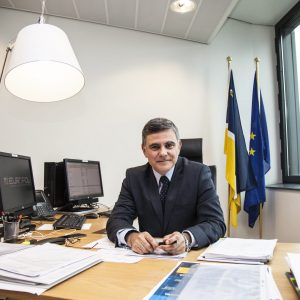
Mr de Eusebio Ramos took up the position of Deputy Director of Europol as Head of the Capabilities Directorate in 2015, being responsible for the areas of ICT, Human Resources, and Finances. Recently, the Management Board has appointed him as Chief Information Officer (CIO) of the Agency, aiming at fostering the Information Management capabilities of EUROPOL. He is responsible for an ambitious digital transformation plan for the Agency based on innovation and the uptake of novel disruptive technologies for the Law enforcement community.
In 1989, Mr de Eusebio Ramos graduated with Honours in MSc Telecommunications Engineer at the Polytechnical University of Madrid. He also holds several advanced studies and certifications in ICT and Public Management.
He has been working in the ICT industry since 1987. His first jobs were in the private sector as an electronic warfare engineer and afterwards as a radio communications systems engineer. In 1992, he became a Member of the Senior Body of State Civil Administrators and began working for the Spanish Government in the Ministry of Industry. Since then, he began what would become the drive and core focus of his career: the digital transformation of public services. Mr de Eusebio Ramos is an expert in the modernization of administrative processes by means of providing leadership and direction to large projects involving disruptive technologies with an impact on millions of citizens. He held relevant positions in the Spanish Ministry of Foreign Affairs (1994), Ministry of Health (1995) and Telecommunications Market Agency (1999).
In 2002, he was appointed to Deputy Director at the Ministry of Public Administration where he was responsible for the overall e-Government strategy of the Spanish Administration.
In 2006, Mr de Eusebio Ramos was promoted to Chief Information Officer of the Road Traffic National Agency where he made a key contribution to the successful launch of the Driver license point-deduction system.
In 2012, Mr de Eusebio Ramos was appointed Executive Advisor to the General Director of the Spanish National Police. He was Project Executive of the Police 3.0 Programme, aimed at the digital transformation of the work conducted by the Spanish national police. He also oversaw the participation of the National Police in several EU security-related projects.
Mr de Eusebio Ramos was born in 1962 in Madrid, Spain. He is married with three children. He speaks English, some French and Spanish. His interests include classical music and photography.
Matti Pitkäniitty (Head of International Affairs Unit, Finnish Border Guard)

Mr Pitkäniitty has been working with the Finnish Border Guard since 1997. He has served in various positions from a border guard station to the Headquarters of the Finnish Border Guard. Currently he is the Head of International Affairs Unit at the Finnish Border Guard Head Quarters and serving in the rank of colonel.
Since 2013 he has been working with international issues related to border management. He has participated to negotiations concerning EU’s Entry/Exit System (EES), European Travel Information and Authorisation System (ETIAS) and Framework for Interoperability between EU Information Systems (Interoperability), as negotiator for Finland or as a member of Finnish negotiation team. He has also been involved in implementation of aforementioned systems at the Finnish Border Guard. His primary interest are not the systems them self, but how they change our border management, processes and quality of the work.
Lorenzo Rinaldi (Head of Division, Forensic Science Police Service, Italian Ministry of Interior & Chair of the EURODAC Advisory Group)
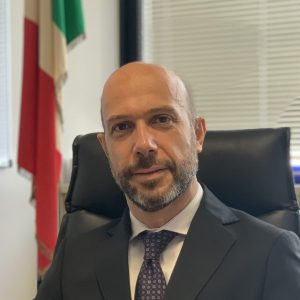
Lorenzo Rinaldi has nearly 20 years of experience in biometric identification systems in the area of public security and migration management.
He is the head of the Electronic Investigation Division of the Italian Forensic Science Police Service of the Central Anticrime Directorate, dealing with Artificial Intelligence for Law Enforcement, digital forensics, biometrics and new technologies. He is the Program Manager for the Italian Face-Recognition System.
Before assuming this position in 2019, he was responsible for the National AFIS and its interfaces with other national, EU and international systems. He has also been the head of operations for the National Access Point to EURODAC and for the datacentre of the Forensic Science Police. At that time, he was entrusted with nation-wide statistical monitoring of the registrations of permit of stay applicants, asylum seekers and irregular migrants.
Between 2004 and 2010, he was in charge for the National Identity Archive of the Ministry of Interior. In the field of personal identification, he also worked on latent fingerprint and handwriting examination, speaker recognition and face comparison.
Mr Rinaldi is the Chairperson of the EURODAC Advisory Group since 2018, having been appointed as the Italian member in 2012.
His areas of expertise are IT systems, identity management, interoperability at national level, information exchange, biometric capture devices, Face Recognition Technologies and voice recognition.
He holds a degree in Physics and a PhD in Remote Sensing from Sapienza University of Rome. He has also completed a special course in e-Document Technology at ALMA Graduate School of University of Bologna and a course on Data Analytics at SDA Bocconi.
Cristian Nicolau (Head of Unit, e-Justice, IT and Document Management, DG JUST, European Commission)
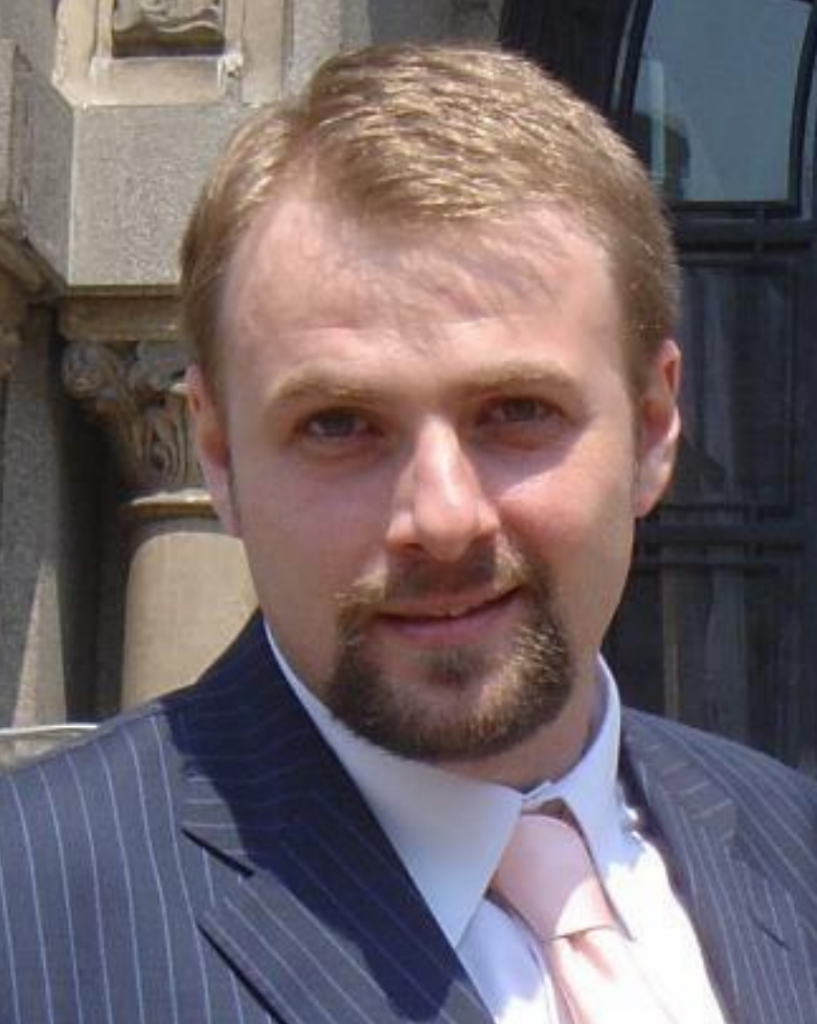
Cristian Nicolau (PhD) is the Head of the e-Justice, IT and Document Management Unit of the Directorate General (DG) for Justice and Consumers of the European Commission.
His work is dedicated to shaping the e-Justice policy and to oversee the implementation of the corresponding action plan. As Information Resource Manager he is responsible for the portfolio of IT systems of DG Justice and Consumers.
Before joining the European Institutions, Cristian worked for the Romanian Ministry of Agriculture and as consultant for the World Bank. Published author of books and scientific papers, he has significant experience in eGovernment and with impact assessments.
Roberto Lenti (Head of Resources Department, Eurojust)
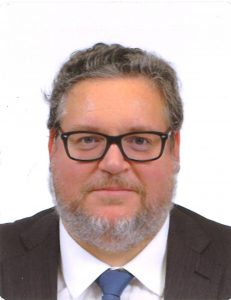
Mr Roberto F. Lenti joined the European Union Agency for Criminal Justice Cooperation (EUROJUST) in 2018 as Head of the Resources Department, responsible for the areas of Human Resources, Budget, Finance and Planning, Legal Affairs, ICT, Physical and ICT Security, Events and logistics.
In 1998, Mr Lenti graduated in Economics, specialising in International Financial Economics, from the Bocconi University in Milan (Italy), and in 2012 attended the Cycle de Hautes Etudes Européennes (CHEE), “Promotion Jean-Claude Trichet” at the Ecole Nationale d’Administration (ENA), in Paris (France).
For the last 23 years he has been working in the European institutions’ environment, specifically from 1999 until 2006 in DG Research in the European Commission, in the areas of evaluation and monitoring of the research Framework programmes, human resources and civil society. He subsequently joined the European Aviation Safety Agency (EASA) covering a number of roles from advisor to two of the Agency Directors, as Head of the ICT and then HR Departments, and was Head of the EASA Brussels office for almost 3 years.
Tim Holthaus (Expert for Legal Information Technology & coordinator of the entity managing the e-CODEX system)

Tim Holthaus is the coordinator of the Me-CODEX III consortium which is the entity currently managing the e-CODEX system. This consortium will hand over the e-CODEX system in mid-2023 to eu-LISA.
Mr Holthaus previously coordinated the former Me-CODEX II project, also ensuring the operation of e-CODEX. He is seconded to the Ministry of Justice in North-Rhine Westphalia, Düsseldorf also dealing with legal questions regarding the national electronic exchange of judicial documents and the electronic judicial file including the preparation of legislative activities in this field.
Mr Holthaus started his career as a judge more than 10 years ago at the Regional Court in Essen working in the field of criminal and civil law. He was also responsible for various administrative matters such as IT matters for courts.
Radek Měrka (Chair of the e-Justice Working Party, Czech Presidency of the Council of the EU)
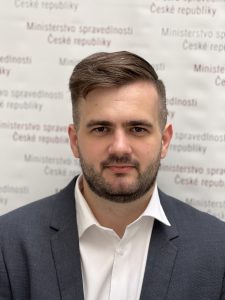
Mr Měrka is chairman of the e-Justice working party during the Czech Presidency of the Council of the European Union and a member of the e-Justice Department of the Ministry of Justice of the Czech Republic.
During his work at the Ministry of Justice Mr Měrka has successfully realised several IT projects and acted as a consultant and co-author on many legislative proposals in e-Justice and e-Government. He was part of the team that launched the largest project in the field of digitalization of justice in the last 20 years in the Czech Republic and is one of the main authors of the national strategy for the development of e-Justice.
Prior to his work at the Ministry of Justice, Mr Měrka worked in the private sector in a law firm. Mr Měrka is an IT law enthusiast who in his spare time, as a hobby, programs simple web applications and dabbles in 3D printing. In addition to his law degree, he also studied psychology and criminology.
Wojciech Wiewiórowski (European Data Protection Supervisor)

Mr Wiewiórowski is serving as European Data Protection Supervisor (EDPS) since 6 December 2019. He also holds the position of adjunct professor in the Faculty of Law and Administration of the University of Gdańsk.
In public administration Mr Wiewiórowski has among others held the positions of an adviser in the field of e-government and information society for the Minister of Interior and Administration, as well as of Director of the Informatisation Department at the Ministry of Interior and Administration. He also represented Poland in the committee on Interoperability Solutions for European Public Administrations (the ISA Committee) assisting the European Commission.
Mr Wiewiórowski served as Inspector General for the Protection of Personal Data (Polish Data Protection Commissioner) in 2010-2014 and the Vice Chair of the Working Party Art. 29 in 2014. In December 2014, he was appointed Assistant European Data Protection Supervisor. After the death of the Supervisor – Giovanni Buttarelli in August 2019 – he replaced Mr Buttarelli as acting EDPS.
Mr Wiewiórowski’s areas of scientific activity include Polish and European IT law, processing and security of information, legal information retrieval systems, informatisation of public administration, and application of new IT tools (semantic web, legal ontologies, cloud, blockchain) in legal information processing.
Olivier Onidi (Deputy Director-General, Directorate-General for Migration and Home Affairs, European Commission)
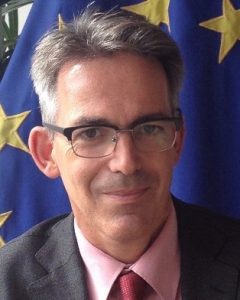
Since May 2016, Olivier Onidi is Deputy Director-General of the Directorate-General for Migration and Home Affairs (DG HOME) at the European Commission with particular responsibility over Schengen and Internal Security. In this capacity, he oversees the activities in the fields of Schengen, borders, information systems, innovation, terrorism and violent extremism, organized crime and cybersecurity. He also led the European Commission’s Task Force for the Security Union and held respectively the EU Anti-Trafficking Coordinator and Counter-Terrorism Coordinator positions. Since July 2022, Olivier Onidi is also the EU Schengen Coordinator.
Olivier Onidi’s last assignment was Deputy Director-General of DG HOME with the specific task to coordinate the Commission-wide work in the context of the refugees’ crisis
Previously, he was Director for the European Mobility Network within the Directorate-General for Mobility and Transport, responsible for the development of the Trans-European Transport Network infrastructure, the implementation of the Connecting Europe Facility funding instrument, the creation of a Single European Rail Area and policy around ports. Prior to this, he was Director for Innovative and Sustainable Mobility in charge of transport security, clean and urban transport, intelligent transport systems and road safety.
Olivier Onidi also worked as Deputy Head of Cabinet of the Energy Commissioner, Mr Günther H. Oettinger, as Head of Unit for air transport services, aviation safety and environment and was Head of the Satellite Navigation System programme – GALILEO.
His first posts in the Commission were Assistant to Directors-General in the areas of Energy and Transport and External Relations. He then moved to the Secretariat General and afterwards became Member of Cabinet of the Commissioner for Research and Development, Innovation, Education and Training.
Before joining the Commission, Olivier Onidi worked as Adviser to the Executive Committee of Belgacom and as Public Policy Manager at American Express International.
Olivier Onidi holds Master degrees in International Economics, European Studies and Business Administration.
Uku Särekanno (Deputy Executive Director, Frontex)
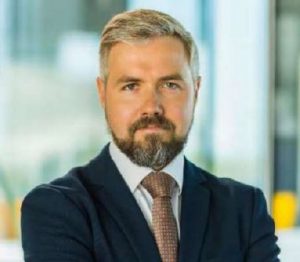
Uku Särekanno is serving as Deputy Executive Director of Frontex. He is responsible for the Agency’s corporate functions, budget and finances, crises management and ICT. His tasks involve direct oversight and coordination of ETIAS Central Unit Division and Financial, Digital and Security Division.
During 19-year-long career Mr Särekanno has worked in senior level positions in the Estonian public administration and European Union institutions. He joined Frontex from the European Union Agency for the Operational Management of Large-Scale IT Systems (eu-LISA) where he served as Head of Cabinet, responsible for general coordination of the Agencies key activities.
Before joining eu-LISA in 2019, he served as Deputy Director General of the Estonian Information System Authority, an agency responsible for the operational management of key components of the Estonian e-governance system. Prior to that he has worked in various positions at the Estonian administration, including Head of Law Enforcement and Criminal Policy in the Ministry of the Interior as well as Justice and Home Affairs Counsellor in the Estonian Permanent Representation to the EU. He coordinated preparations for the Estonian EU Presidency in 2017 and worked for the European Commission Task Force 50, supporting Chief Negotiator Mr Barnier in interinstitutional relations and negotiations with UK. In his earlier career, he worked for the Estonian Government Office, coordinating European Council related positions and administrative preparations for the Estonian accession to the EU.
Mr Särekanno holds Master of Law from the University of Tartu (2020) and MA degree on Public Administration from the Tallinn University (2003). The Estonian Police and Border Guard Board awarded him with the Medal of Honour in 2014.
Luca Tagliaretti (Deputy Executive Director, eu-LISA)

Mr Tagliaretti has more than 20 years of experience working with European Institutions and International Organisations. From 2011 until taking up the Deputy Executive Director post at eu-LISA, in 2020, he led the Technical Centre of the Central Bank Counterfeit Deterrence Group (CBCDG), a global association of Central Banks that supports and deploys technologies that deter the use of digital equipment to counterfeit currencies. Prior to that, Mr Tagliaretti worked as a Senior Expert at the European Central Bank (ECB), focusing on setting the common quality and technical standards for banknote production and protecting the integrity of banknotes against counterfeiting.
Mr Tagliaretti holds an Engineering Degree from the Polytechnic of Milan, a Master´s Degree from the School of Management of the Polytechnic of Milan (MIP) and an MBA from Oxford Brookes University. He has also completed the Advanced Leadership and Management Programme (OALMP) at Saïd Business School, Oxford University and the Program of Negotiation (PON) at Harvard University.
Theofanis Syrigos (Head of the Business Relations Management Sector, eu-LISA; Chair of the EES-ETIAS Advisory Group)

Mr Theofanis Syrigos is the Head of the Business Relations Management Sector at eu-LISA and the EES-ETIAS Advisory Group Chairman. In this capacity, he led and coordinated the activities of the Working Group for the ICT solutions of the Member States with external Land and Sea borders.
Mr Syrigos is an ICT engineer with more than 25 years of experience in the field of large-scale IT Systems in the area of Justice and Home Affairs. He served in numerous Diplomatic Missions of his home country, he was the Head of the Schengen Sector in the Ministry of Foreign Affairs, as well as a seconded National Expert at the European Commission, DG Home Affairs.
Maria Bouligaraki (Head of Planning and Standards Unit, eu-LISA)

Maria Bouligaraki is the Head of the Planning and Standards Unit in eu-LISA, driving a diverse portfolio of products and services. She started her journey with eu-LISA the first day of the agency’s operations in the distant 2012 and witnessed the huge growth of the agency and the opportunities and challenges in fulfilling its critical mission for the EU.
Ms Bouligaraki is an experienced leader with almost 25 years of experience in leading multidisciplinary teams and driving digital transformation programmes within EU and National administrations, under different policy contexts. She holds a BSc in Information Systems and MSc degrees in EU Law, Information Systems and Artificial Intelligence as well as various professional certifications. Her latest study focused on the impact of AI in EU Law.
She is passionate about innovation and technology with a human focus and a member of various groups focused on innovation and AI. She is a Mentor for Women in IT and member of ‘Women in Tech’ initiatives aiming at a more diverse and inclusive tech industry.
Johannes Tralla (Moderator of the Conference)

Mr Tralla is a journalist at Estonian Public Broadcasting who started his career reporting on technology and culture.
He was the Brussels based EU correspondent from 2012 to 2018. From the autumn of 2018 Mr Tralla has been hosting a current affairs program “Esimene stuudio” and a foreign news program “Välisilm” on ETV.
He is also anchoring and reporting the news for Aktuaalne kaamera.

